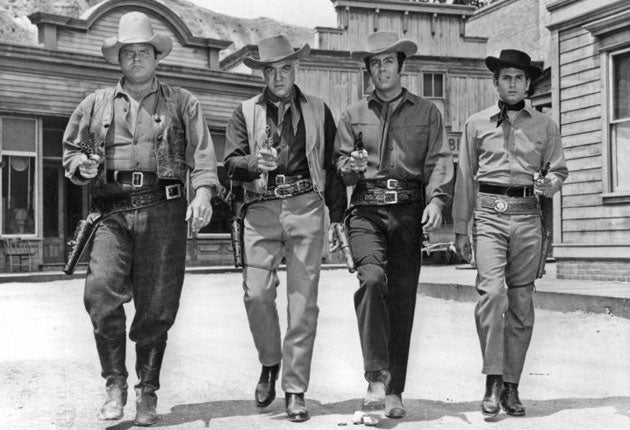David Dortort: Television producer and writer who created 'Bonanza' and 'The High Chaparral'

When the producer David Dortort created Bonanza, he bucked the trend of casting established actors as the programme's stars, gave it a family feel and ended up with television's second-longest-running Western, behind Gunsmoke – as well as one of the first series to be filmed and broadcast in colour.
Set on the Ponderosa ranch in 19th-century Nevada, Bonanza (1959-73)followed the adventures of a wealthy family living the American dream. The emphasis was on home and traditional values, ahead of gunfights and shootouts. "Most Westerns are fullof cowpokes in dusty cowtowns," the shy, gentle Dortort explained. "How about the glories of the West? The lakes, the mountains, the cool, clean air? Also, I was concerned about the damagetelevision was doing to the American father image. He was being portrayed as a weakling and idiot. I wanted to reinstate him."
The producer did so by casting the Canadian actor Lorne Greene as the three-times-widowed patriarch Ben Cartwright, having been told by Lee J Cobb's agent that his client "didn't do television". Dortort hired Greene after watching him in an episode of Wagon Train and considered that the supporting actor made that programme's star, Ward Bond, look weak and indecisive.
Recalling working with Michael Landon on the pilot of The Restless Gun, Dortort considered him for the role of Ben's youngest son, the hot-headed Little Joe. He worried that the actor might be too young and immature for the part but was convinced otherwise when his wife, Rose, saw a publicity photograph of Landon and declared: "He has a face blessed from Heaven."
Dan Blocker, who had worked with Dortort in another episode of The Restless Gun, was the producer's immediate choice as the middle son, the buffoonish Eric, known as "Hoss". Because the actor was preparing to return to Texas and his career as a schoolteacher, Dortort paid him $100 to stay in Hollywood for another week while he won round television executives who objected to Blocker's 20-stone-plus weight.
Last to be cast, as the eldest son, Adam, was Pernell Roberts, an actor with New York stage experience, a few film parts and some one-off television appearances behind him. Seeing him on a sound stage at Universal Studios, Dortort thought that he fitted perfectly the role of the serious, introspective and protective brother, who always wore black, giving him a mysterious air that made him a sex symbol.
However, Dortort had to assert his authority when Roberts removed his toupée on the second day of shooting and said he wanted to play the role without it. The producer objected, saying its removal made him look 15 years older. The incident began a history of friction between the pair and Roberts left Bonanza in 1965, less than halfway through its run, complaining that "the scripts were ground out like sausages" and there was no time for rehearsal.
As Bonanza continued, Dortort devised another television Western, The High Chaparral (1967-71), which also enjoyed international success, and he became executive producer of both. Again, he broke all the rules, shooting much of the new programme on location in Arizona, instead of on a Hollywood sound stage, and treating Native Americans with dignity and respect.
The High Chaparral was a variation on the Bonanza theme, featuring Leif Erickson as Big John Cannon, the widower who ran an Arizona ranch. Dortort recalled the actor from an episode of Bonanza and added Cameron Mitchell as his fun-loving brother Buck, Mark Slade as his son Billy Blue, Linda Cristal as his second wife Victoria, and Henry Darrow as his brother-in-law, Manolito. Slade landed the role of the authority-questioning son after pulling Dortort out of his chair by the lapel of his suit during an audition.
David Solomon Katz was bornin New York City in 1916, the son ofBeryl Dortort, a Jewish immigrant from Eastern Europe who changed hisname to Benjamin Katz. As an adult, David changed his own surname to his father's original one. Dortort graduated in English and philosophy fromCity College of New York, then worked at the radio station WNYC and wrote for magazines.
He also wrote novels, one of which was the best-selling Burial of the Fruit (1949). Burt Lancaster's film company commissioned him to turn the book into a screenplay, but it was eventually rejected. Undeterred, Dortort persisted in writing for the screen and received his first credit when he and Horace McCoy adapted Claude Stanush's novel The Lusty Men (1952) into a film directed by Nicholas Ray.
Dortort found his way into television with scripts for programmes such as Lassie (1956) and the series The Restless Gun (1957-59), becoming its producer before launching Bonanza. He later created The Chisholms (1979-80), a Western starring Robert Preston as the head of a pioneering family. He also revived Bonanza in three television films in the 1980s and 1990s, and created the prequel series Ponderosa (2001-02).
David Solomon Katz (David Dortort), writer and producer: born New York City 23 October 1916; married 1940 Rose Seldin (one son, one daughter; died 2007); died Los Angeles 5 September 2010.
Subscribe to Independent Premium to bookmark this article
Want to bookmark your favourite articles and stories to read or reference later? Start your Independent Premium subscription today.

Join our commenting forum
Join thought-provoking conversations, follow other Independent readers and see their replies